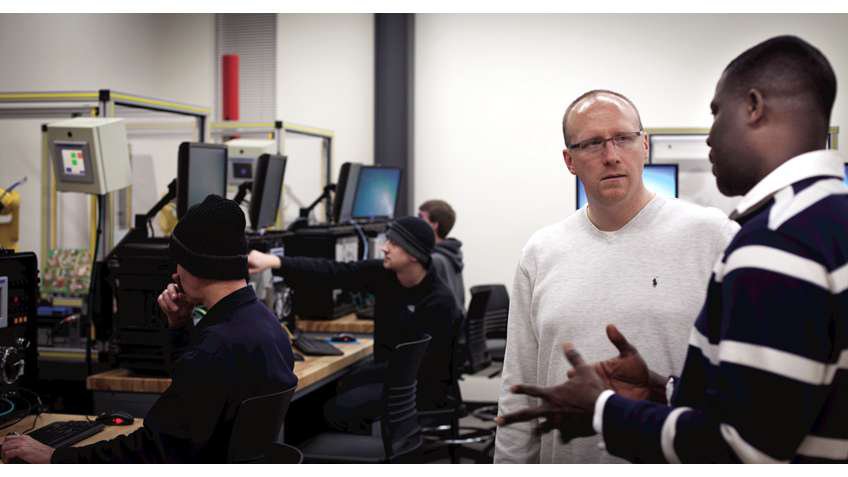Challenge
That growth – combined with fast-paced advances in manufacturing technologies – has spurred demand for skilled manufacturing technicians in Wisconsin. But at the same time, many experienced technicians and industrial maintenance people are retiring.
“Employers are struggling to find qualified entry-level people to work as technicians,” Dettmer said. “One reason is that many younger people haven’t known about opportunities in manufacturing. And a lot of them haven’t been interested in hearing about them.”
The reason: The lingering, old-school image of manufacturing. “People who aren’t working in the manufacturing arena don’t really know what manufacturing looks like these days,” Dettmer said. “There’s still the perception that manufacturing means a dirty, grimy job where you stand at piece of machinery and do the same thing for eight hours every day.”
Dettmer often encountered this misperception – among both students and parents – when he joined Madison College five years ago as an instructor. When he joined the Madison College faculty, the college offered students some training with programmable logic controllers (PLCs) and other industrial technology classes.
But manufacturing leaders in the Madison area wanted more comprehensive training to bridge their growing skills gap. Dettmer and others formed a steering committee to help identify those needs and chart a course for Madison College to meet them.
Starting in 2009, the committee helped the college secure workforce-initiative grants from the state and federal government to expand its industrial class offerings, and purchase and update equipment for hands-on instruction.
Dettmer also developed a new two-year associate degree called automated manufacturing systems technology with co-program director Rick Jacobs.
“Our goal was to allow students – not only high school graduates, but people who needed retraining or who were underemployed or unemployed – to start from basically zero knowledge in manufacturing, and learn everything necessary to have a successful career and good income upon graduation,” Dettmer explained.
At first, the classes were taught using various course materials, like textbooks, and equipment from different vendors. However, Dettmer and his colleagues – along with regional manufacturers who sit on the advisory committee that helps oversee the Madison College automation curriculum envisioned a more focused program to meet the hiring needs of employers in the district.
Solution
Through surveys and direct discussions, Dettmer and his colleagues learned that the majority of local manufacturers were standardized on Rockwell Automation equipment. “We sought out Rockwell Automation at different trade shows and learned about some of the new products and training materials,” Dettmer said.
“We were very interested in the training curriculum because we recognized it could be a great asset for our program.” Madison College contacted Rockwell Automation, requesting to become part of the company’s Educational Support Program.
The program provides accredited educational institutions and students with economical access to Rockwell Automation hardware, software and training tools. The partnership between Madison College and Rockwell Automation grew with its success. Madison College decided to standardize its automated manufacturing program on Rockwell Automation training curriculum, equipment and workstations.
